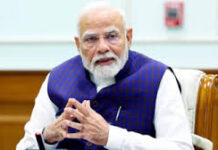New Delhi (NVI): If your weight starts increasing before you turn 40, then you are more at the risk of getting caught by cancer, a recent study claims.
The 2019 study at the University of Bergen in Norway tried to find out whether adults (over forty) who are overweight (BMI over twenty-five) or obese (BMI over thirty) have different types of increased cancer risks.
It was shown in the study that if you become obese before the age of forty, then the chances of these cancers increase:
*70% of endometrial cancer
*Renal-cell cancer (fifty-eight per cent in men.
*Twenty-nine per cent chance of colon cancer in men.
The probability of all types of cancer-related to obesity increases by fifteen per cent in men and women, the study found.
“Obesity is known to be a risk factor for many cancers,” said Professor Tone George of the Department of Global Public Health and Primary Care at Bergen University., who headed the study.
In this research, we focused on the time, degree and duration of obesity risk, cancer risk and being overweight, he said.
Researchers in the study included adults with two or more measurements and separately placed them for at least three years before potentially diagnosed cancer. Researchers monitored the activities of all individuals for an average of about eighteen years.
The findings of the study also revealed that post-menopause women who are overweight and obese, have a higher risk of breast cancer, endometriosis, kidney cancer and colon cancer risk.
Participants from Norway, Sweden and Austria participated in this study. The study, Mee-Can, analyzed data from 2,20,000 (two lakh twenty thousand) adults. Health screening information, including length and weight, was correlated with data from the National Cancer Registry.
During the investigation, 27,881 (twenty-seven thousand and eight hundred eighty-one) adults were diagnosed with cancer, of which 35 (thirty-five) per cent i.e. 9,761 (nine-thousand seven hundred sixty-one) were related to obesity.
Obese participants were found to be at a higher risk of developing obesity-related cancer than those with normal BMI (BMI greater than thirty) in the first and second health check-ups.
“Cancer risk was found to be sixty-four per cent in men and forty-eight per cent in women,” said George.
Professor George said, “our main message is to create a necessary public health strategy to reduce the risk of cancer, by the prevention of weight gain.”








